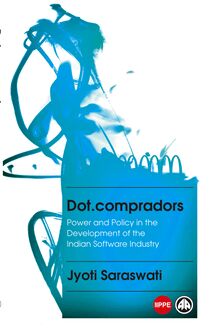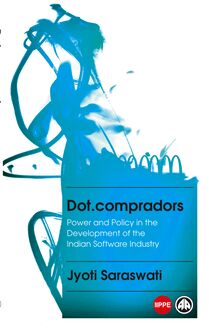Dot.compradors , livre ebook
177
pages
English
Ebooks
2012
Obtenez un accès à la bibliothèque pour le consulter en ligne En savoir plus
Découvre YouScribe et accède à tout notre catalogue !
Découvre YouScribe et accède à tout notre catalogue !
177
pages
English
Ebooks
2012
Obtenez un accès à la bibliothèque pour le consulter en ligne En savoir plus
Publié par
Date de parution
06 juillet 2012
EAN13
9781849647342
Langue
English
Poids de l'ouvrage
2 Mo
Dot.compradors reveals the darker reality behind 'India Shining', providing a history of the industry from the 1970s to the present. Jyoti Saraswati punctures the myth of a free-market industry by revealing the role of state intervention and how vested interests and elite corruption have shaped, and continue to shape, one of the world’s most dynamic sectors.
Saraswati argues that the interests attached to the software industry and the policies they are pursuing are both an impediment to the growth of local software firms and to a broader-based, more egalitarian form of development in India.
Preface
Acknowledgements
A Note on the Terminology
Glossary
List of Figures
A Primer: the Seven Leading Myths about the Indian IT Industry
1. Introduction
Part I: The Context
2. The Global Software Services Industry: An Overview
3. The Development of the Software Industry in India: Existing Explanations and their Shortcomings
4. The Political Economy of State Intervention and Industrial Transformation: An Analytical Framework
Part II: The Development of the Indian IT Industry
5. IT Started with a War
6. Catalytic Corruption: The Domestic Software Services Boom, 1978-1986
7. Manna from Heaven: Satellites, Optic Fibres and the Export Thrust, 1986-2000
8. Passage to India: The Giants in the Land of the Majors, 2000-2010
Part III: The Analysis
9. The Indian Mutiny: From Potential IT Superpower to Back Office of the World
10. Lessons from the Lies: What Does IT Mean?
11. Conclusion: Of Compradors and Useful Idiots
Notes
Appendices
Index
Publié par
Date de parution
06 juillet 2012
EAN13
9781849647342
Langue
English
Poids de l'ouvrage
2 Mo









